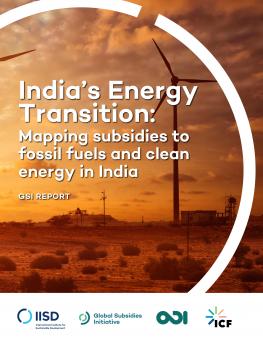
India's Energy Transition: Mapping subsidies to fossil fuels and clean energy in India
This report maps out the context, magnitude, trends and impacts of India’s energy subsidies. It aims to enhance transparency and dialogue on energy choices in India and to help track shifts in government support from fossil fuels to renewables.
This report maps out the context, magnitude, trends and impacts of India’s energy subsidies. It aims to enhance transparency and dialogue on energy choices in India and to help track shifts in government support from fossil fuels to renewables.
The reviewed subsidies are grouped according to the energy type they benefit: a) coal; b) oil and gas; and c) renewable energy. In addition, we single out the grouping of subsidies to d) electricity transmission and distribution (T&D) that are, in theory, neutral to the energy source, though in practice benefit mostly coal because of its dominance in India’s electricity generation. Subsidies to nuclear power and large hydropower were excluded due to the lack of data.
If finds that energy subsidies from the central government declined substantially between FY2014 and FY2016, from INR 216,408 crore (USD 35.8 billion) to INR 133,841 crore (USD 20.4 billion). While the large majority of this expenditure supports fossil fuels and a fossil-fuel-dominated electricity system, the trends also show a sharp decline in fossil-fuel subsidies and an increase in renewable energy subsidies, suggesting a shift in priorities. Full details on the subsidies identified and quantified are provided in the report and its annexes.
Energy subsidies have wide ramifications beyond government budgets, including for markets, society and the environment, and are linked to issues such as stranded assets, enhancing energy access, public health and climate change. Transparency can help to enable an informed debate among the public and policy-makers on how well aligned they are with India's objectives.
Additional downloads
You might also be interested in
Increased Support Needed to Achieve India's Clean Energy Goals
India is on track to achieve many of its 2030 clean energy goals but needs to step up government support measures to accelerate the deployment of offshore wind, electric vehicles, and green hydrogen, according to a new report.
India Faces Clean Energy Challenges as Energy Demand Soars and Global Fossil Fuel Subsidies Rise
New research finds the global energy crisis and increasing energy demand have pushed India's energy subsidies to a 9-year high.
G20 energy ministers call for cooperation on nuclear energy & low-emission hydrogen
The Group of 20 energy ministers' meeting concluded in Goa on July 22, 2023, with the final summary failing to include language on the phase-down of unabated fossil fuels.
Implementing Solar Irrigation Sustainably
This guidebook provides recommendations to state policy-makers on how they can implement solar irrigation models, particularly decentralized solar plants for irrigation under the PM-KUSUM scheme, effectively and sustainably.